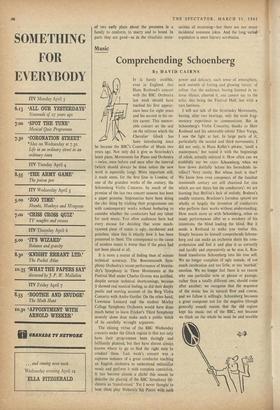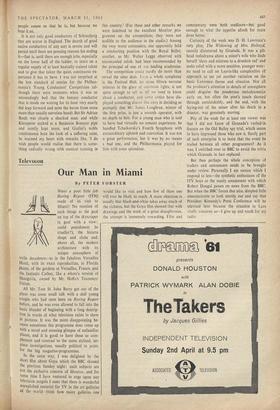Music
Comprehending Schoenberg
By DAVID CAIRNS Jr is barely credible, even in England, that Hans Rosbaud's concert with the BBC Orchestra last week should have marked his first appear- ance here for eight years and his second in his en- tire career. This memor- able concert set the seal on the reforms which the Chevalier Glock has been introducing since he became the BBC's Controller of Music two years ago. Not only did it give us Stravinsky's latest piece, Movements for Piano and Orchestra —twice, once before and once after the interval (which should always be done unless the new work is especially long). More important still, it made sense, for the first time in London, of one of the grandest works of the century, the Schoenberg Violin Concerto. So much of the promise of the last two concert seasons has been a paper promise. Impresarios have been doing the chic thing by tricking their programmes out with contemporary works without bothering to consider whether the conductors had any talent for such music. Too often audiences have had every excuse for deciding that some much- vaunted piece of music is ugly, incoherent and pointless, since this is exactly how it has been presented to them. The consequence to the cause of modern music is worse than if the piece had not been played at all.
It is more a matter of feeling than of minute technical accuracy. The Bournemouth Sym- phony Orchestra's recent performance of Stravin- sky's Symphony in Three Movements at the Festival Hall under Charles Groves was justified, despite certain technical shortcomings, because it showed real musical feeling, as did their deeply poetic and moving account of the Berg Violin Concerto with Andre Gertler. On the other hand, Lawrence Leonard and the student Morley College Symphony Orchestra would have done much better to leave Fricker's Third Symphony severely alone than make such a public botch of its carefully wrought argument.
The shining virtue of the BBC Wednesday concerts under the Glock regime is that not only have their programmes been daringly and brilliantly planned, but they have almost always known where to go to find the right men to conduct them. Last week's concert was a supreme instance of a great conductor teaching an English orchestra to understand unfamiliar music and perform it with complete conviction. It has become almost a cliche this season to describe the playing of the BBC Symphony Or- chestra as 'transformed.' Yet I never thought to hear them play Webern's Sik Pieces With such power and delicacy, such sense of atmosphere, such warmth of feeling and glowing variety of colour that the audience, having listened in in- tense silence, cheered it, one cannot say to the echo, this being the Festival Hall, but with a rare lustiness.
I will not talk of the Stravinsky Movements, having, after two hearings, only the most frag- mentary experience to communicate. But in Schoenberg's Violin Concerto, thanks to Herr Rosbaud and his admirable soloist Tibor Varga, I saw the light at last. In large parts of it, particularly the second and third movements, I did not only, in Hans Keller's phrase, 'smell a masterpiece,' but tasted it with the beginnings of relish, actually enjoyed it. How often can we truthfully say we enjoy Schoenberg, when we bow down dutifully before his formidable in- tellect? Very rarely. But whose fault is that? We know how even composers of the familiar nineteenth century are still chastised for sins which are not theirs but the conductors'; we are learning that Berlioz's lack of melody, Brahms's muddy textures, Bruckner's formless sprawl are wholly or largely the invention of conductors who perform their works without understanding. How much more so with Schoenberg, when so many performances offer us a mockery of his intentions, the blind leading the blind. But it needs a Rosbaud to make you realise this. Simply because he himself comprehends Schoen- berg and can make an orchestra share his com- prehension and feel it and play it as correctly and lucidly and expressively as he sees it, Ros- baud transforms Schoenberg into his true self. We no longer complain of ugly sounds, of too much cerebration and too little, or too 'morbid,' emotion. We no longer feel there is no reason why one particular note or phrase or passage, rather than a totally different one, should come after another; we recognise that the sequence of the music has its natural flow and course, and we follow it willingly. Schoenberg becomes a great composer not for the negative (though generally sound) reason that the old regime kept his music out of the BBC, not because we think on the whole he must be and sensible people assure us that he is, but because we hear it so.
It is not only good conductors of Schoenberg that are scarce in England. The dearth of good native conductors of any sort is severe and will persist until there are pressing reasons for ending it—that is, until there are enough jobs, especially on the lower half of the ladder, to insist on a regular supply of at least basically trained talent and to give that talent the quiet, continuous ex- perience it has to have. I was not surprised at the low standard of entries for the Philhar- monia's Young Conductors' Competition (al- though there were moments when it was so astoundingly bad that the fantasy conductor that is inside me waiting for its hour very nearly did leap forward and seize the baton from some more than usually nerveless hand). But Sir Adrian Boult was clearly a shocked man, and while Klemperer sucked at a Benjamin Bouncer pipe and mostly kept mum, and Giulini's noble countenance bore the look of a suffering saint, he warmed my heart with remarks like, 'I do wish people would realise that there is some- thing radically wrong with musical training in this country.' (For these and other remarks we were indebted to the excellent Monitor pro- gramme on the competition; they were not audible to the audience in the studio.) Among the very worst contenders, one apparently held a conducting position with the Royal Ballet; another, as Mr. Walter Legge observed with unconcealed relish. had been recommended by the principal of one of our leading academies.
The competition could hardly do more than reveal the utter duds Evan a whole symphony in the Festival Hall. let alone fifteen nervous minutes in the glare of television lights, is not quite enough to tell us all we need to know about a conductor, and some critics have dis- played something almost like envy in deciding so promptly that Mr. James Loughran, winner of the first prize, is just a smooth operator, with no depth to him. For a young man who is said to have had virtually no concert experience, he handled Tchaikovsky's Fourth Symphony with extraordinary aplomb and conviction. It was not a great performance, but it was by no means a bad one, and the Philharmonia played for him with some splendour.



































 Previous page
Previous page